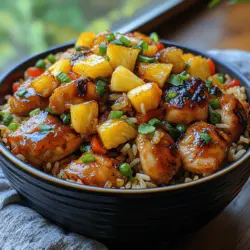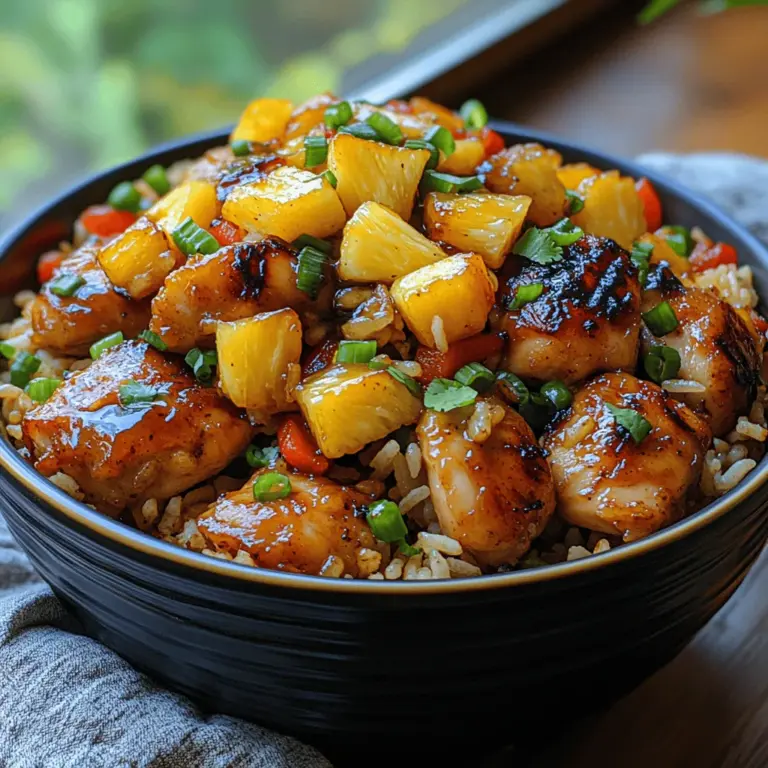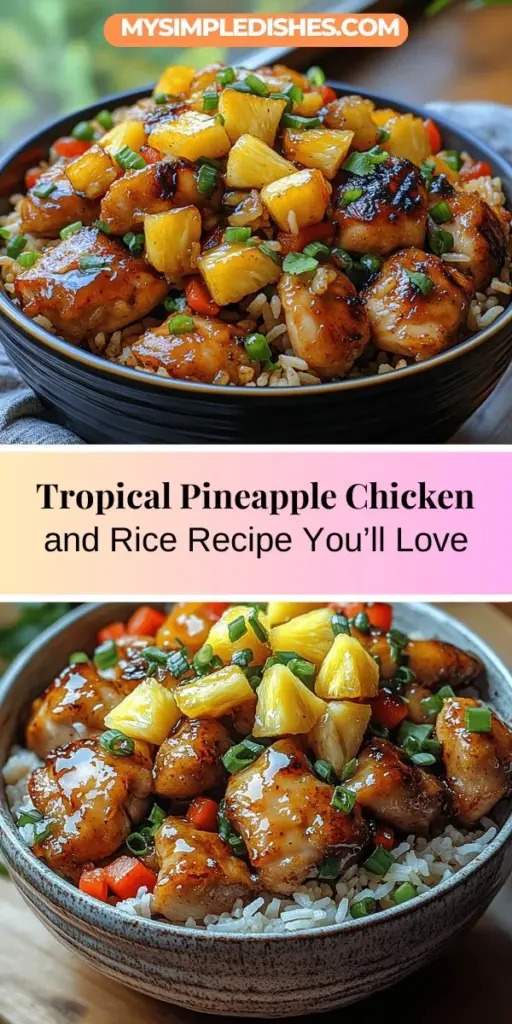Introduction
If you’re seeking a delightful escape to the tropics without leaving your kitchen, look no further than our Pineapple Chicken and Rice recipe. This vibrant dish encapsulates the essence of tropical cuisine, combining succulent chicken with the sweetness of pineapple, all served over fluffy jasmine rice. Perfect for busy weeknights or special gatherings, this recipe is not only quick to prepare but also bursting with flavor, making it an ideal choice for anyone looking to elevate their dinner game.
In today’s fast-paced world, finding meals that are both quick and flavorful can be a challenge. Whether you’re a busy parent juggling work and family, a student managing a hectic schedule, or simply someone who wants to put a delicious meal on the table without spending hours in the kitchen, this Pineapple Chicken and Rice recipe fits the bill perfectly. The balance of savory and sweet flavors, along with the vibrant colors of the ingredients, will delight your taste buds and impress your guests.
The main ingredients in this dish—chicken, pineapple, jasmine rice, and an array of colorful vegetables—come together to create a dish that is not only visually appealing but also packed with nutritional benefits. Throughout this article, we will explore these ingredients in detail and provide you with all the tools you need to create this tropical delight in your own kitchen.
The Essence of Tropical Cuisine
Tropical cuisine is characterized by its vibrant flavors, bold ingredients, and the use of fresh produce that reflects the sunny climates where it originates. The appeal of tropical flavors lies in their ability to evoke a sense of warmth and relaxation, reminiscent of sun-soaked beaches and lush landscapes. In the case of Pineapple Chicken and Rice, the combination of sweet pineapple and savory chicken creates a harmonious balance that captivates the palate.
The health benefits of the key ingredients in this dish are noteworthy. Chicken, a lean source of protein, supports muscle growth and maintenance, making it a staple in many diets. Pineapple, a tropical powerhouse, is rich in vitamins and minerals, particularly vitamin C and manganese, and contains bromelain, an enzyme known for its anti-inflammatory properties. The addition of colorful bell peppers not only enhances the dish’s visual appeal but also adds a wealth of vitamins A and C, contributing to overall health.
Culturally, pineapple has significant importance in many tropical regions. It’s often seen as a symbol of hospitality and warmth, making it a beloved ingredient in various culinary traditions. From Hawaiian luau feasts to Caribbean jerk dishes, pineapple plays a versatile role in cooking, adding a sweet and tangy element that complements savory flavors beautifully.
Ingredients Breakdown
Understanding the ingredients in your dish is crucial for achieving the best flavor and texture. Here’s a detailed breakdown of each component in our Pineapple Chicken and Rice recipe:
Chicken
The star of our dish, chicken, offers a fantastic protein source that is both versatile and easy to cook. For this recipe, boneless, skinless chicken thighs or breasts work well, with thighs providing a bit more flavor and juiciness. Chicken is not only rich in protein but also contains essential vitamins and minerals such as B vitamins, phosphorus, and selenium, which contribute to energy metabolism and bone health.
Jasmine Rice
Jasmine rice is widely regarded for its fragrant aroma and slightly sticky texture, which makes it an excellent choice for absorbing the flavors of the dish. When cooking jasmine rice, it’s essential to rinse it under cold water before cooking to remove excess starch. This step ensures that the rice cooks evenly and achieves the desired fluffy texture. Cooking jasmine rice in chicken broth instead of water can enhance its flavor, adding depth to the overall dish.
Pineapple
Whether you choose fresh or canned pineapple, this ingredient is vital to the dish’s sweetness and acidity. Fresh pineapple is ideal for its bright flavor and texture, while canned pineapple is convenient and often packed in juice, adding moisture. When using canned pineapple, be sure to drain it well to prevent excess liquid from watering down your dish. The natural sugars in pineapple caramelize beautifully when cooked, creating a delightful contrast with the savory elements of the chicken and rice.
Bell Peppers
Adding bright color and crunch, bell peppers are not only visually appealing but also contribute essential nutrients to the dish. Rich in vitamins A and C, bell peppers support immune function and skin health. You can use a mix of red, yellow, and green bell peppers to create a vibrant presentation, but feel free to select your favorites. Their sweetness pairs perfectly with the pineapple and balances the savory flavors of the chicken.
Aromatics: Onion, Garlic, and Ginger
Aromatics are the backbone of flavor in many dishes, and this recipe is no exception. Onions add sweetness and depth, while garlic brings a pungent kick that enhances the overall flavor profile. Fresh ginger contributes a warm, spicy note that complements the sweetness of the pineapple and balances the dish. Together, these aromatics create a fragrant base that elevates your Pineapple Chicken and Rice.
Sauces: Soy Sauce and Hoisin Sauce
The use of sauces in this recipe adds layers of flavor that are essential for creating a well-rounded dish. Soy sauce provides a savory umami flavor, while hoisin sauce adds sweetness and a hint of spiciness. Together, they create a delicious glaze that coats the chicken and melds with the rice, ensuring every bite is full of flavor.
Seasonings: Black Pepper, Salt, and Red Pepper Flakes
Seasoning is crucial to bringing out the best in your ingredients. A pinch of salt enhances the natural flavors of the chicken and vegetables, while black pepper adds a subtle heat. For those who enjoy a bit of spice, red pepper flakes can be added to taste, providing an extra kick that contrasts beautifully with the sweetness of the pineapple.
Step-by-Step Cooking Instructions
Now that you understand the key ingredients, let’s delve into the cooking process. We’ll begin with the essential steps to prepare the rice and marinate the chicken, setting the foundation for this tropical delight.
Preparing the Rice
1. Rinse the Rice: Start by measuring out your jasmine rice. Rinse it under cold water in a fine mesh strainer until the water runs clear. This step removes excess starch, preventing the rice from becoming gummy during cooking.
2. Cook the Rice: In a medium saucepan, combine the rinsed rice and a suitable amount of chicken broth. The broth infuses the rice with flavor, enhancing the overall taste of the dish. Bring the mixture to a boil, then reduce the heat to low, cover, and simmer according to the package instructions, typically around 15-20 minutes. Once cooked, remove it from the heat and let it sit for a few minutes before fluffing it with a fork.
Marinating the Chicken
1. Prepare the Marinade: While the rice is cooking, prepare the marinade for the chicken. In a bowl, combine soy sauce, hoisin sauce, minced garlic, grated ginger, and a pinch of black pepper. This mixture will infuse the chicken with flavor and ensure it remains tender during cooking.
2. Marinate the Chicken: Cut the chicken into bite-sized pieces and add it to the marinade, ensuring each piece is well-coated. Let the chicken marinate for at least 15-30 minutes. If time allows, marinating for a longer period can deepen the flavors even further.
These initial steps are crucial for setting up the dish and ensuring that each component is flavorful and well-prepared. The next phase will involve cooking the marinated chicken and vegetables, bringing the tropical flavors to life. Stay tuned as we guide you through the rest of this delicious recipe!
{{image_1}}
Suggested Marination Time and Tips
Marinating the chicken is a crucial step that elevates the flavors of your Pineapple Chicken and Rice. For the best results, marinate the chicken for at least 30 minutes to 2 hours. This timeframe allows the meat to absorb the tangy and sweet notes of the marinade, resulting in a more flavorful dish. If time allows, consider marinating the chicken overnight in the refrigerator—this not only enhances the flavor but also tenderizes the meat, making it juicy and succulent.
To prepare the marinade, combine pineapple juice, soy sauce, garlic, ginger, and a touch of brown sugar. Ensure the chicken is evenly coated by using a resealable plastic bag or a glass bowl with a lid. For added depth of flavor, you can include a splash of sesame oil or a pinch of red pepper flakes for a hint of spice. Remember to reserve some marinade before adding it to the chicken for later use in the sauce.
Cooking the Chicken
Once the chicken has marinated, it’s time to cook it. Preheat a large skillet or wok over medium-high heat and add a tablespoon of vegetable oil. The oil should shimmer but not smoke; this indicates that it’s hot enough for cooking. Remove the chicken from the marinade, allowing excess liquid to drip off, and add it to the hot skillet.
Cook the chicken in batches if necessary to avoid overcrowding the pan. Overcrowding can lead to steaming rather than searing, preventing that delightful caramelization. Sauté the chicken for about 5-7 minutes, turning occasionally until it’s golden brown and cooked through (the internal temperature should reach 165°F).
Techniques for Achieving the Perfect Stir-Fry
Stir-frying is an art that combines high heat with quick cooking times to retain the integrity and texture of the ingredients. Here are some techniques to master the stir-fry process:
1. Prep Ingredients Ahead: Have all your ingredients prepped and ready to go before you start cooking. This ensures a smooth cooking process and prevents overcooking.
2. Use High Heat: Stir-frying requires high heat to cook quickly. This helps to seal in flavors and moisture. If your skillet is not hot enough, the food will steam instead of fry.
3. Keep It Moving: Stir constantly to ensure even cooking and prevent burning. Use a spatula or wooden spoon to toss the ingredients frequently.
4. Add Ingredients in Stages: Start with proteins (like chicken), followed by denser vegetables (like bell peppers and carrots), and finish with lighter vegetables (like snow peas and green onions) that require less cooking time.
Importance of Cooking Temperature and Timing
Cooking temperature and timing are critical in achieving the right texture and flavor for your Pineapple Chicken and Rice. If the chicken is cooked too long, it can become dry and tough. Conversely, undercooked chicken poses health risks. Monitoring the cooking time is essential, and using a meat thermometer can help ensure that your chicken reaches a safe internal temperature without overcooking.
Sautéing the Vegetables
Once the chicken is perfectly cooked, it’s time to sauté the vegetables. In the same skillet, add a little more oil if necessary, then toss in your prepped vegetables—bell peppers, onions, and snap peas are excellent choices. Sauté for 3-5 minutes until they are crisp-tender.
Tips for Achieving the Right Texture and Flavor Balance
To achieve the ideal texture, aim for a vibrant mix where vegetables remain crunchy but not raw. Avoid overcrowding the pan during this stage as well—this can lead to uneven cooking. Season lightly with salt and pepper, and consider adding a splash of soy sauce or a sprinkle of sesame seeds to enhance the flavor profile.
Importance of Adding Aromatics in Cooking
Aromatics like garlic, ginger, and scallions play a vital role in building flavor. Add these ingredients towards the end of cooking the vegetables to prevent them from burning and to maximize their flavor release. Aromatics also contribute to the overall aroma of the dish, making your kitchen smell inviting and delicious.
Combining Ingredients
After the chicken and vegetables are cooked to perfection, it’s time to combine everything. Return the chicken to the skillet with the sautéed vegetables. Pour in the reserved marinade and add fresh pineapple chunks. The pineapple not only adds sweetness but also acidity, which balances the dish beautifully.
The Significance of Integrating Pineapple and Sauces
Mix everything together gently, ensuring the sauce coats the chicken and vegetables evenly. This step is crucial, as it creates a cohesive dish where each bite contains a combination of flavors. Allow the mixture to simmer for a few minutes to let the sauce thicken slightly and the flavors meld together.
Serving Suggestions
For an appealing presentation, serve the Pineapple Chicken and Rice in shallow bowls or on plates, garnished with freshly chopped cilantro or green onions. A wedge of lime can add a refreshing touch and a burst of acidity.
Pair this dish with side options like steamed jasmine rice or a simple green salad dressed with a light vinaigrette. For beverages, consider serving a chilled white wine or a tropical fruit mocktail to complement the flavors of the dish.
Nutritional Information
This Tropical Delight: Pineapple Chicken and Rice recipe is not only delicious but also a nutritious option. Each serving contains approximately 350-400 calories, depending on portion size and specific ingredients used.
Macronutrients Breakdown:
– Protein: 30g
– Carbohydrates: 45g
– Fat: 10g
The chicken provides a rich source of protein, essential for muscle repair and growth, while the pineapple adds natural sugars, vitamins C and B6, and dietary fiber. The colorful vegetables contribute a variety of vitamins and minerals, making this dish a balanced meal option.
Discussion on the Health Aspects of the Recipe
Incorporating more fruits and vegetables into your meals is an excellent way to boost your overall health. This recipe not only satisfies your taste buds but also packs a nutritional punch. The combination of protein, vitamins, and minerals contributes to a well-rounded diet, and the tropical flavors can help you feel like you’re on vacation—even if you’re just dining at home.
Cooking Tips and Tricks
For those with dietary restrictions, this recipe offers flexibility. Here are some suggestions for ingredient substitutions:
– Gluten-Free: Use tamari instead of soy sauce to keep the dish gluten-free.
– Vegetarian Options: Substitute chicken with tofu or tempeh, ensuring you adjust the cooking time accordingly.
– Low-Carb: Use cauliflower rice instead of regular rice for a lower carbohydrate option.
Storage Tips for Leftovers and Reheating Methods
If you have leftovers, store them in an airtight container in the refrigerator for up to three days. To reheat, simply microwave in a safe dish or warm in a skillet over low heat until heated through. You may want to add a splash of water or additional pineapple juice to help maintain moisture.
Ideas for Customizing the Recipe to Personal Preferences
Feel free to customize this dish to suit your personal preferences. Experiment with different vegetables—broccoli, carrots, or zucchini can all work well. If you love heat, consider adding diced chili peppers or a drizzle of sriracha for an extra kick.
Conclusion
Tropical Delight: Pineapple Chicken and Rice is not just a meal; it’s an experience that transports you to a sunny beach with every bite. The balance of sweet pineapple, tender chicken, and crisp vegetables creates a dish that is both satisfying and nutritious. By following this recipe, you not only create a delightful culinary experience for yourself but also for your loved ones.
We encourage you to try this recipe and savor the tropical flavors in your own kitchen. Cooking is a joyful activity, and sharing meals with friends and family can create lasting memories. Embrace the joy of cooking, and let this dish be a part of your culinary adventures!


